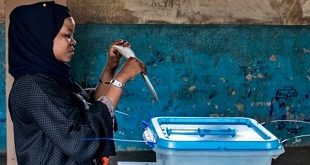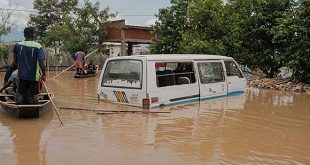
Lagos, Nigeria | AFP | Nigeria’s upcoming presidential elections are the sixth to be held since civilian rule was restored in 1999 and the first to involve voters with no experience of military government.
AFP spoke to some first-time voters in Africa’s most populous country to find out what they think of Nigeria today — and what they hope it will become.
– Michael John Jagaba, 20, Jos –
“Democracy, for me, is the right to vote for anyone… and also to have the right to say or air your views without the fear of the government. It’s something we lack in this nation.
“I live on what I’m able to get from my music and other side hustles. My ambition is to have a business for myself, just something that won’t make me rely on the government, but something that makes a lot of money, too. It will be legal, though!
“Nigeria someday will be fine. In the future, the people will be able to vote for someone who is not driven by selfish ambitions, but by a core and heartfelt desire to make things easier for the common man.
“Once the average person in the society has three square meals daily, we’re good to go.”
– Elijah Apinkpo, 22, Lagos –
“I am working with a youth media team advocating for slum communities. Democracy is supposed to mean the government is hugely influenced and controlled by the people.
“But in real life, democracy is a group of people that know themselves very well and have common ambitions against the people. Public interest should be the priority, but it is the opposite.
“I live in an environment where the system doesn’t enable people like me. There’s no guarantee that you will realise your dreams.
“I grew up in a community called Otodo Gbame where private individuals conspired with the government to demolish our properties and do business on our land.
“It’s affected the livelihoods of so many people. Many left, and children stopped going to school.
“I assume we’re more free than our parents. People can express themselves on radio stations, but there are also limits because these rich people own the media, too.”
– Musa Abdullahi, 20, Kano –
“I have finished secondary school and now I’m an apprentice in a metal workshop making sliding doors and windows. My dream is to continue my education.
“Democracy is a process by which citizens elect leaders they feel are competent to lead them, in contrast to military rule where soldiers usurp power and do as they please.
“From what we were told, there was repression under military rule, because even street vendors were not spared as soldiers would raid them, impound their wares and beat them up. No one had freedom.
“Now, one has the right to go to the media and express themselves and speak on the realities of life. There is greater freedom now than before, although we didn’t experience what happened in the past and only rely on what we were told.
“Yes, I have obtained my voter’s card, and by the grace of God I’ll cast my vote for the first time this year.
“I want to vote and take my destiny in my own hands in order to elect the most competent candidate, the candidate of my choice. This is why I want to vote.”
– Ogheneochuko Obire, 18, Warri –
“I live with my parents who take care of my educational needs. During our holidays, I also take up some menial jobs to raise some monies for my personal needs. My goal is to be a lawyer.
“I was told by my dad that life then was very rough and tough when the military was in power as they do not follow the rule of law and consistently flaunt court orders.
“But now, our votes count compared to the early days of democracy in 1999. With the use of our permanent voters cards and card readers I believe my vote will count.
“I believe we are still learning and growing our democracy as a country. Yes, we do have our challenges, but America and other developed countries have been practising uninterrupted democracy for hundreds of years. We will one day get to the promised land.”
– Abulkadir Sadiq, 18, Maiduguri –
“I study science but I want to become a civil engineer.
“I’m in school because of my parents, who took care of me. But the government still has not provided schools for the youth and jobs so the country can develop.
“Nigeria will be a country that will provide not only crude oil but many other mineral resources and natural resources if we diversify our economy, particularly the agriculture sector.
“Crude oil alone cannot provide for all the needs of the citizens.
“My goal is to live in a good environment where natural disasters, such as desertification, are less common.”
 The Independent Uganda: You get the Truth we Pay the Price
The Independent Uganda: You get the Truth we Pay the Price


